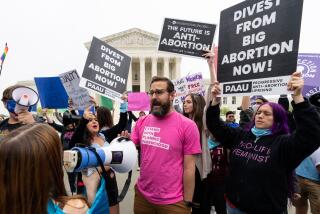Supreme Court ruling on campaign contributions: More clout for the rich
WASHINGTON — The wealthiest 1% of Americans will likely play an even larger role in elections following the Supreme Court decision Wednesday that freed rich donors to give as much as $3.5 million per election to the array of candidates running for Congress.
The 5-4 decision struck down a Watergate-era limit that barred a single donor from giving more than $123,200 to congressional candidates every two years.
The 1974 federal election law, designed to limit the influence of money on Capitol Hill, is in the process of being whittled away by the high court.
Four years ago, in the Citizens United ruling, the court’s conservative majority freed corporations, unions and wealthy persons to spend unlimited sums on their own on election campaigns.
In what appears to be Act II of this drama, the same majority has struck down the total limits on direct contributions to candidates. Chief Justice John G. Roberts, speaking in court, said the right to free speech—including free spending on politics—trumps any concern for “the public good.”
“No matter how desirable it may seem, it is not an acceptable government objective to ‘level the playing field’,” he said.
DOCUMENT: The ruling in McCutcheon v. FEC
While the legal dispute was fought out as a 1st Amendment issue, the case itself had a clear partisan overtone.
The Republican National Committee went to court to challenge the total contribution limit, and it won with the votes of the five justices who were Republican appointees.
Obama administration lawyers had defended the limit, arguing that caps worked to prevent the very wealthy from having undue influence on Capitol Hill. The four Democratic appointees agreed and dissented from the decision.
“If the court in Citizens United opened a door, today’s decision may well open a floodgate,” Justice Stephen Breyer said in a dissent he read in court. “It creates a loophole that will allow a single individual to contribute millions of dollars to a political party or a candidate’s campaign.”
But it is important to note that Wednesday’s decision did not throw out the limits on how much a donor may give to a single candidate. The current limit is $2,600 per election. If a candidate faces a primary and a general election, a donor may give him or her $5,200 this year.
READ MORE: After ruling, battle for Congress likely to heat up
Roberts in his opinion said those limits were not challenged in the case. He also suggested they could be defended as a means to prevent “corruption.”
Justice Clarence Thomas, in a separate opinion, said he would have gone further and thrown out all the contribution limits.
Supporters of the campaign funding laws sharply criticized the ruling.
Fred Wertheimer, a champion of funding limits, said the court had “overturned 40 years of national policy and 38 years of judicial precedent.” He said the court’s decision “re-created the system of legalized bribery today that existed during the Watergate days.”
Twitter: @davidgsavage
More to Read
Sign up for Essential California
The most important California stories and recommendations in your inbox every morning.
You may occasionally receive promotional content from the Los Angeles Times.









